The Angry Himalayas Part III: Opium Wars - How China Lost Vladivostok to Russia
The Angry Himalayas Part III: Opium Wars - How China Lost Vladivostok to Russia
Mangalore Today News Network
By Dr. G. Shreekumar Menon
Mangaluru, August 1, 2020: Haishenwei or the Bay of Sea Slugs was a relatively small Manchu settlement under the sovereignty of the Qing dynasty. The first territorial disputes between China and Russia can be traced to the 1600s when Russia encouraged its people to settle down in the region. By 1680, however, China took over control of this region, that eventually led to the signing of the Treaty of Nerchinsk in 1689 between the Qing Dynasty and Russia.
During the First Opium War that occurred between September 1839 and August 1842, fought between India-Britain and the Chinese Qing Dynasty, the British began exploring and mapping this stretch of the coast and named it as Port May. 167 years later, when the Second Opium war broke out, Russian military presence increased in this region.
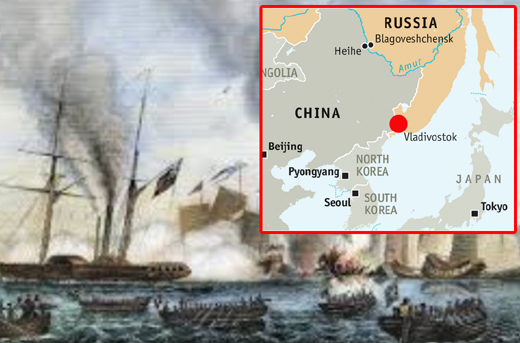
Historical accounts of the Opium Wars, written by Western historians hasfocussedmainly on Britain, France and China under the Qing dynasty, while India and Russia are neglected. The role of Indian soldiers and the then Indian Army formations have been totally ignored and undue importance and credit given to British Army officers. Because of its unique role, particularly during the Second Opium War, Russia acquired a significant amount of former Manchu territory, including Vladivostok that is its largest port on the Pacific coast.
The first Opium War ended in 1842, when Chinese officials signed, at gunpoint, the Treaty of Nanjing. The treaty provided extraordinary benefits to the British, including:
•an excellent deep-water port at Hong Kong;
•a huge indemnity (compensation) to be paid to the British government and merchants;
•five new Chinese treaty ports at Guangzhou (Canton), Shanghai, Xiamen (Amoy), Ningbo, and Fuzhou, where British merchants and their families could reside;
•extraterritoriality for British citizens residing in these treaty ports, meaning that they were subject to British, not Chinese, laws; and
•a “most favoured nation” clause that any rights gained by other foreign countries would automatically apply to Great Britain as well.
In 1856, the second Opium War broke out and continued until 1860, when the Indian-British and French forces captured Beijing and forced on China a new round of treaties, indemnities, and the opening of 11 more ports referred to as Treaty Ports.
In 1860, Indian, British,and French troops landed near Beijing and fought their way into the city. Negotiations quickly broke down and the British High Commissioner to China Lord Elgin ordered the combined Indian-British troops to destroy the Imperial Summer Palace, a complex and garden where Qing Dynasty emperors had traditionally handled the country’s official matters.
Shortly after that, the Chinese emperor fled to Manchuria in northeast China. His brother negotiated the Convention of Beijing, which, in addition to ratifying the Treaty of Tientsin, added indemnities and ceded to Britain the Kowloon Peninsula across the strait from Hong Kong. The war ended with a greatly weakened and battered Qing Dynasty.
Russian diplomat Count Nikolay Pavlovich Ignatyev had witnessed the havoc and plunder that the Indian, British, and French forces had unleashed upon Beijing, including the burning down of the Old Summer Palace, specifically ordered by Britain’s Lord Elgin.
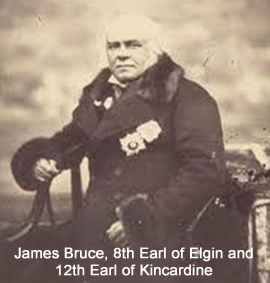 Elgin, having set his eyes on the loot and destruction of the Forbidden City, next, compelled the Chinese to sit at the negotiating table with Count Nikolay Pavlovich Ignatyev a Russian statesman and diplomat, as the mediator in what came to be known as the Convention of Peking between China, Russia, Britain and France.
Elgin, having set his eyes on the loot and destruction of the Forbidden City, next, compelled the Chinese to sit at the negotiating table with Count Nikolay Pavlovich Ignatyev a Russian statesman and diplomat, as the mediator in what came to be known as the Convention of Peking between China, Russia, Britain and France.
As a result of this convention, in October 1860, the British acquired the Kowloon Peninsula and control over Hong Kong. Among other agreements, opium was made legal, a move that economically benefited France and Britain. From China’s perspective, these agreements were exploitative and sharply skewed in favour of the two western nations.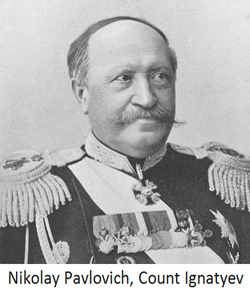 Knowing how desperately China was trying to protect its capital, Ignatyev pushed for the Qing rulers to accept the terms of the agreements, and also threw in what the Chinese call “Outer Manchuria” for Russia, an area significantly larger than what it had originally desired. One part of this territory is now called the Primorsky Krai. Russia gained 400,000 square miles, without fighting a battle. This area of the Primorsky Krai, along with the Golden Horn Bay, with its administrative capital as Vladivostok, became an important sea port for Russia and allowed the country to expand economic and military influence in this part of the Pacific. It is also known as the Russian Maritime Province. Today, Vladivostok is the base for the Russian Pacific Fleet.
Knowing how desperately China was trying to protect its capital, Ignatyev pushed for the Qing rulers to accept the terms of the agreements, and also threw in what the Chinese call “Outer Manchuria” for Russia, an area significantly larger than what it had originally desired. One part of this territory is now called the Primorsky Krai. Russia gained 400,000 square miles, without fighting a battle. This area of the Primorsky Krai, along with the Golden Horn Bay, with its administrative capital as Vladivostok, became an important sea port for Russia and allowed the country to expand economic and military influence in this part of the Pacific. It is also known as the Russian Maritime Province. Today, Vladivostok is the base for the Russian Pacific Fleet.
The face of East Asia was refigured in this process. Chinese historians’ target foreigners as morally culpable for having used Opium to intoxicate, impoverish and demoralise the Chinese people, in what is also referred to as “policies to empoison”. In China today the Opium Wars are the traumatic inauguration of the country’s modern history. All nations around China contributed to the “Century of Humiliation”
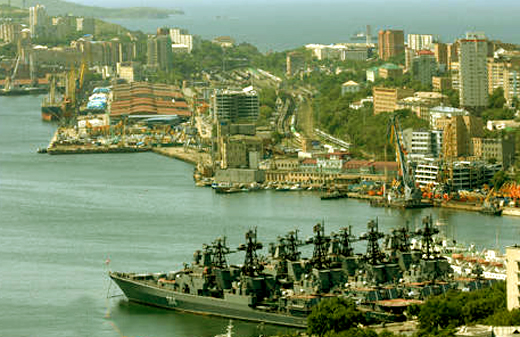
The Sino–Russian border was realigned in Russia’s favour along the Amur and Ussuri rivers. As a result, China lost Outer Manchuria (an area of more than 1 million km), and access to the Sea of Japan.
Russia’s involvement in the Opium Wars is often overlooked or not accorded importance by Western Historians. A young Russian Major General Nikolay Ignatyev ensured Russian success at the Convention of Peking and the Chinese ceded even more land to the Russians, giving them control of everything between the River Amur and the Golden Horn Bay. Ignatyev’s astute diplomacy is one of the glorious highlights of the Opium Wars, obtaining 400,000 square miles of strategic territory without a single shot being fired is unparalleled and unprecedented in World History.
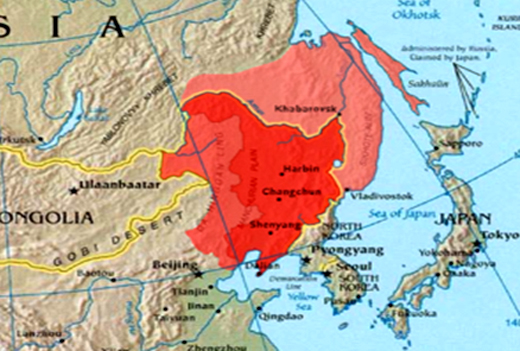
Chinese social media, are full of aggressive demands to recover this lost territory. A posting on a popular Chinese internet forum, for example, claimed that the Chinese people “are all in tears” when they see that the “table of unrecovered territory” includes Vladivostok and other lands now controlled by Russia. Chinese are taught at school about “unequal treaties” and foreign land grabs. Chinese are taught that Vladivostok city and much of eastern Russia was and, one day, should again be Chinese.
Chinese social media anguished outpourings read like these “Today we can only endure, but the Chinese people will remember, and one generation after another will continue to remember!” and another wrote, “We must believe that this ancestral land will return home in the future!” South China Morning Post quoted one Weibo user.
There is an important lesson here for Indians who are in the habit of not teaching history to their posterity in its entirety, the lessons to be learnt from different conflicts, the losses suffered, and most important, the obligation of future generations to continue efforts to reclaim lost territories. While the Chinese compulsorily teach their youngsters about the Opium Wars, in Indian history texts there is zero mention of the role of the various Indian Army regiments of those days who participated in the battles and ensured the defeat of the Chinese. Territories lost by India are written off by short sighted politicians using specious arguments like “…. not a blade of grass can grow there”. The perspicacious observation of American philosopher George Santayana becomes relevant here “Those who do not read history are bound to repeat it”. Indians should start dissecting History and learn why there were losses, how the losses occurred and the trauma suffered by our ancestors at the hands of barbaric invaders.
Related Article:
Part 1: THE ANGRY HIMALAYAS - String of pearls vs Garland of Opium
Part 2: The Angry Himalayas-Part II: Tibet Needs a Warrior - Monk or Dob-dobs
 Dr. G. Shreekumar Menon IRS (Rtd) Ph.D: Former Director General of National Academy of Customs Indirect Taxes and Narcotics & Multi-Disciplinary School Of Economic Intelligence India; Fellow, James Martin Centre For Non Proliferation Studies, USA; Fellow, Centre for International Trade & Security, University of Georgia, USA; Public Administration, Maxwell School of Public Administration, Syracuse University, U.S.A.; AOTS Scholar, Japan. He can be reached at: shreemenon48@gmail.com
Dr. G. Shreekumar Menon IRS (Rtd) Ph.D: Former Director General of National Academy of Customs Indirect Taxes and Narcotics & Multi-Disciplinary School Of Economic Intelligence India; Fellow, James Martin Centre For Non Proliferation Studies, USA; Fellow, Centre for International Trade & Security, University of Georgia, USA; Public Administration, Maxwell School of Public Administration, Syracuse University, U.S.A.; AOTS Scholar, Japan. He can be reached at: shreemenon48@gmail.com
- Need For ‘Students, Alcohol and Drugs’ survey
- New Synthetic Drugs Trapping Youth
- Mood Modifying Chips - Future of Drug Use
- Ramping up Indo-Bangla border security
- IITM- A premier educational Institution in a forest. What can we learn?
- Former PM, Manmohan Singh: Notable laws passed under his tenure
- Hashish on Ratnagiri Seashore
- The Poor cry out to Us: Do we respond?
- Clandestine Meth Labs Sprouting Across India
- Hydro ganja from Bangkok latest craze among youth in India
- "Memories to Treasure" Dr.Michael Lobo’s new book
- Dominance of Private Universities: Will it make education inaccessible to underprivileged students?
- Monti Phest: A rich heritage of South Canara
- Kashmir Bhavan in Bengaluru: A must visit place
- "MAI and I" Book of Angelic Emotions
- Draupadi Murmu - The New ’President of India’
- Anthony Ashram in the city grows a classic museum
- First College of Fisheries in India - A Golden Jubilarian
- Flushing Meadows - A Vintage Mansion
- The Colonel�s Bequest
- A Mangalorean PM and his RBI Governor Brother: The Extraordinary story of the Benegal Brothers
- There is no higher religion than Truth: Theosophical Society
- L�affaire - Ashu & Yiju of Mangalore
- Mangalore in Kowloon
- 1568 to 2018 AD: 450 years of Christianity in Mangaluru
- Vice President elect Naidu moves on from nadir to zenith, the phenomenal journey
- Embracing the Outdoors: How Heated Jackets Are Revolutionizing Cold Weather Activities
- Efficient and Sustainable Packaging Solutions with FIBCs
- The Hybrid Kilt Revolution | Where Tradition Gets Trendy
- Affordable Elegance | Embrace Style on a Budget with Cheap Kilts
- Unleashing Style and Functionality | Exploring Tactical Kilts
- Mangalore’s Heroic Lady marks 105th Birthday
- Santa the Christmas spirit
- Geriatric care: Mangalore strikes a fine balance
- The Don Who Made Two Empires to Clash
- CHITRAPUR SARASWATS - A Great Kanara Community
- Our new President Ram Nath Kovind’s significant journey to Rashtrapathi Bhavan
- Marriages made in heaven, big fat weddings made in India
- Eid insight - The giver of glad tidings
- CITY INFORMATION
- TRAVEL
- TOURIST INFORMATION
- HEALTH CARE
- MISCELLANEOUS




 Write Comment
Write Comment E-Mail To a Friend
E-Mail To a Friend Facebook
Facebook Twitter
Twitter  Print
Print 


